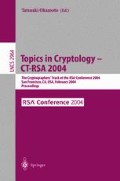Abstract
We analyze a new class of primitives called weak commitments. We completely characterize when bit commitments can be reduced to these primitives. Also, we employ a new concept in cryptographic reductions, the rate of a reduction. We propose protocols achieving a nontrivial rate. We provide examples of how to implement these primitives based on oblivious transfer and on quantum mechanics. Using the theory here developed, some open problems on computationally secure quantum bit commitments are solved. Our reductions are information theoretically secure.
Access this chapter
Tax calculation will be finalised at checkout
Purchases are for personal use only
Preview
Unable to display preview. Download preview PDF.
References
Bennett, C.H., Brassard, G., Crépeau, C., Maure, U.: Generalized Privacy Amplification. IEEE Transaction on Information Theory 41(6), 1915–1923 (1995)
Cachin, C.: On the Foundations of Oblivious Transfer. In: Nyberg, K. (ed.) EUROCRYPT 1998. LNCS, vol. 1403, pp. 361–374. Springer, Heidelberg (1998)
Crepeau, C., Kilian, J.: Achieving oblivious transfer using weakened security assumptions. In: 29th Symp. on Found. of Computer Sci., pp. 42–52. IEEE, Los Alamitos (1988)
Crépeau, C.: Efficient Cryptographic Protocols Based on Noisy Channels. In: Fumy, W. (ed.) EUROCRYPT 1997. LNCS, vol. 1233, pp. 306–317. Springer, Heidelberg (1997)
Crepeau, C., Dumais, P., Mayers, D., Salvail, L.: Apparent Collapse of Quantum State and Computational Quantum Oblivious Transfer, pre-print available at http://crypto.cs.mcgill.ca/~crepeau/PS/subqmc-3.ps
Cover, T., Thomas, J.: Elements of Information Theory. Wiley, Chichester (1991)
Crepeau, C.: Efficient Cryptographic Protocols Based on Noisy Channels. In: Fumy, W. (ed.) EUROCRYPT 1997. LNCS, vol. 1233, pp. 306–317. Springer, Heidelberg (1997)
Damgård, I.B., Kilian, J., Salvail, L.: On the (Im)possibility of Basing Oblivious Transfer and Bit Commitment on Weakened Security Assumptions. In: Stern, J. (ed.) EUROCRYPT 1999. LNCS, vol. 1592, p. 56. Springer, Heidelberg (1999)
Damgard, T., Pedersen, B.: Pfitzmann: Statistical Secrecy and Multi-Bit Commitments. IEEE Transactions on Information Theory 44(3), 1143–1151 (1998)
Dumais, P., Mayers, D., Salvail, L.: Perfectly Concealing Quantum Bit Commitment from Any Quantum One-Way Permutation. In: Preneel, B. (ed.) EUROCRYPT 2000. LNCS, vol. 1807, pp. 300–315. Springer, Heidelberg (2000)
Kilian, J.: Founding Cryptography on Oblivious Transfer. In: Proceedings of the 20th ACM Symposium on the Theory of Computing (1988)
Lo, H.K., Chau, H.F.: Is quantum Bit Commitment Really Possible? Physical Review Letters 78(17), 3410 (1997)
Mayers, D.: The Trouble With Quantum Bit Commitment (March 1996), http://xxx.lanl.gov/abs/quant-ph/9603015
Maurer, U., Wolf, S.: Information-Theoretic Key Agreement: From Weak to Strong Secrecy for Free. In: Preneel, B. (ed.) EUROCRYPT 2000. LNCS, vol. 1807, pp. 351–368. Springer, Heidelberg (2000)
Naor, M.: Bit Commitment Using Pseudorandomness. J. of Cryptology 4, 151–158
Nascimento, A., Mueller-Quade, J., Imai, H.: Optimal Multi-Bit Commitment Reductions to Weak Commitments. In: ISIT 2002, p. 294 (2002)
Rivest, R.L.: Unconditionally secure commitment and oblivious transfer schemes using concealing channels and a trusted initializer (pre-print)
Salvail, L.: Quantum Bit Commitment From a Physical Assumption. In: Krawczyk, H. (ed.) CRYPTO 1998. LNCS, vol. 1462, pp. 338–353. Springer, Heidelberg (1998)
Stinson, D.: Cryptography: Theory and Practice. CRC Press, Florida (1995)
Wyner, A.D.: The WireTap Channel Bell System J., 54, 1355–1387 (1981)
Winter, A., Nascimento, H.: Imai, Commitment Capacity of Discrete Memoryless Channels, http://xxx.lanl.gov/abs/cs.CR/0304014
Yao, A.: Security of Quantum Protocols Against Coherent Measurements. In: Proceedings of the 26th Annual ACM Symposium on the Theory of Computing (1995)
Author information
Authors and Affiliations
Editor information
Editors and Affiliations
Rights and permissions
Copyright information
© 2004 Springer-Verlag Berlin Heidelberg
About this paper
Cite this paper
Nascimento, A.C.A., Mueller-Quade, J., Imai, H. (2004). Bit String Commitment Reductions with a Non-zero Rate. In: Okamoto, T. (eds) Topics in Cryptology – CT-RSA 2004. CT-RSA 2004. Lecture Notes in Computer Science, vol 2964. Springer, Berlin, Heidelberg. https://doi.org/10.1007/978-3-540-24660-2_15
Download citation
DOI: https://doi.org/10.1007/978-3-540-24660-2_15
Publisher Name: Springer, Berlin, Heidelberg
Print ISBN: 978-3-540-20996-6
Online ISBN: 978-3-540-24660-2
eBook Packages: Springer Book Archive

